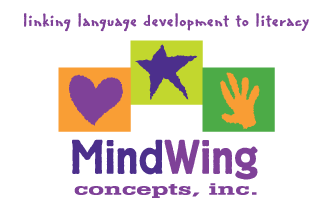Secure Checkout. FREE SHIPPING for Continental U.S. Orders over $60.
Menu
-
- Home
-
About Us
-
The Approach
-
Linking Language & Literacy
-
Professional Learning
-
Learning Resources
-
SHOP
-
Blog
-
- About MindWing
- Our People
- Contact Us
- Your Account
- Login
-
United States (USD $)

Secure Checkout. FREE SHIPPING for Continental U.S. Orders over $60.
Tech Tuesday: Summer Study Series #3, Consider the Functional
by Sean Sweeney July 26, 2021 3 min read
 In July’s entry for 2021’s Summer Study Series, we’ll be looking at the critical overlap between narrative and expository language and our students’ access to the academic curriculum.
In July’s entry for 2021’s Summer Study Series, we’ll be looking at the critical overlap between narrative and expository language and our students’ access to the academic curriculum.
 Meaux and Norris (2018) tackle this topic in a tutorial for Language, Speech and Hearing Services in Schools entitled “Curriculum-Based Language Interventions: What, Who, Why, Where, and How?” I have always appreciated ASHA publications’ “tutorial” articles, as I have found them to provide the most functional and practical information to be useful in interventions. The other “functional” consideration in this article is that it includes a focus on curriculum which has always seemed natural to me. There is so much inherent language in school curricula and, from a linguistic perspective, this potential gap in comprehension and expression is why students receive our services.
Meaux and Norris (2018) tackle this topic in a tutorial for Language, Speech and Hearing Services in Schools entitled “Curriculum-Based Language Interventions: What, Who, Why, Where, and How?” I have always appreciated ASHA publications’ “tutorial” articles, as I have found them to provide the most functional and practical information to be useful in interventions. The other “functional” consideration in this article is that it includes a focus on curriculum which has always seemed natural to me. There is so much inherent language in school curricula and, from a linguistic perspective, this potential gap in comprehension and expression is why students receive our services.
To that point, Meaux and Norris begin with a quote from Judy Montgomery (who has collaborated with MindWing on literature-based language teaching units in the East Meets West volumes): “Language is a pervasive part of each life, and SLPs can serve as the glue that unites the child with his or her environment.” The article goes on to outline:
- Clarification of the roles of SLPs in schools, particularly with regard to literacy development, outlined by ASHA, and tying into language-based skills which run across the curriculum.
- The connections between language and literacy skills and the standards detailed in the Common Core Curriculum, the narrative and expository aspects of which are broken down functionally in MindWing’s The “Core” of The Core: Using Story Grammar Marker® and Other MindWing Concepts Tools To Support Students in Meeting Grade-Level Common Core State Standards.
- Ground their definition of Curriculum-Based Language Intervention (CBLI) in functionality, as it “directs the focus of intervention toward functional changes that are relevant to the child’s communicative needs in the academic setting.”
- Detail five types of curricula that have language “underpinnings” (e.g., narrative and expository contexts, syntax, vocabulary, social rules):
- Official, e.g., standards
- Cultural, pertaining to world knowledge
- De-facto, practical use of the texts and curriculum tools chosen by the school
- School Culture
- Hidden, relating to those unwritten rules of the specific environment.
- Story Grammar Marker® can be a key tool, and also explicit teaching of syntactic aspects (look to aligning tools such as MindWing’s Cohesive Tie JAR-gon Activity Kit).
Interestingly, from a tech perspective, the authors also provide a great example of how visual tools provided by PowerPoint (see also Google Slides) can be used to present narrative and syntactic content, with some tie-ins to the evidence-based practice of shape coding for syntax.
I hope you will check out the article for more details and a practical look at this angle on intervention. The authors, as many do, place a focus on English Language Arts, but I always like to remind people that the same language structures are present in content areas such as science and social studies.
For examples of engaging contextual tools to explore, check out some free TinyBop activities provided on the FunBrain website. Each of these are largely wordless but contain tons of inherent language needed to explain the lists, sequences, and cause and effect related to each activity, as well as guides for use.

iCivics provides a continued wonderful resource of educational games related to civics, which after all is a formalized version of Social Thinking®, with its connection to understanding others’ thoughts, wants, and needs, group planning and problem solving. The games on iCivics contain narrative content for guiding students’ thinking, as well as expository aspects.

Sean Sweeney
Sean Sweeney, MS, MEd, CCC-SLP, is a speech-language pathologist and technology specialist working in private practice at the Ely Center in Needham, MA, and as a clinical supervisor at Boston University. He consults with local and national organizations on technology integration in speech and language interventions. His blog, SpeechTechie (www.speechtechie.com), looks at technology “through a language lens.” Contact him at sean@speechtechie.com.
Leave a comment.
Comments will be approved before showing up.
